All Out!! is a great anime to watch. It’s fun, it’s sweet, and it’s exciting. It doesn’t teach as much about rugby as I would have hoped, but who cares about that when the action scenes are heart-stopping and the athletes’ stories send your emotions on a roller-coaster ride? Gion and his teammates take us on a tour into the rough and tough world of rugby and share with us what this sport is about.

Unbreakable
“Sekizan, you should definitely play rugby! This penetrating gaze, these broad shoulders, this sturdy lower body! It’s like you were born to play rugby!” With these words, Hachiōji Mutsumi tried to lure his fellow first-year into joining the rugby club at Kanagawa High School (in short: Jinkō). But Sekizan Takuya had no interest in playing this contact sport with a bunch of half-hearted team members who viewed the activity as nothing more than a leisurely pastime. In sports, Sekizan would never settle for anything less than ‘giving it all.’ Therefore, it wasn’t Hachiōji’s sweet talking that finally swayed Sekizan’s heart and mind to join the club, but seeing him train diligently… alone… in the pouring rain.
With only Sekizan and Hachiōji taking the sport seriously, the team as a whole wasn’t blessed with success. And while the senpai walked off the field smiling and jesting after every defeat, Sekizan cried bitter tears of frustration and anger. Yet, despite these disheartening experiences, his resolution to keep giving his utmost best remained unbroken. So strong was his unbending will and so intense was his fierce determination that it radiated from his gaze.

This caught the eyes of his very first and very dedicated ‘fan,’ Tadakazu Taira, then a first-year at Keijō High School’s rugby club. Their ‘relationship’ reminded me a little of Pepé Le Pew and Penelope Pussycat. Whenever they met, Taira was bursting with excitement and enthusiasm. Yearning to play against his strong-willed opponent, Taira poured out his fiery passion toward the coy and distant Sekizan as soon as he saw him. Sekizan, on the other hand, took every opportunity to escape his admirer’s grasp. Taira was enthralled by Sekizan’s unbreakable spirit, which emanated from his eyes, and he couldn’t help but fall in love with them. Naturally, he wanted to prove his affection in the ‘best’ way an athlete can: by defeating his beloved: “When you look at me with these eyes, I just have to crush you!” As rough as their on-field interactions are, off-field, Taira’s charming passion and over-the-top enthusiasm, as well as Sekizan’s evasive behavior, made for great comic relief, and their encounters never failed to make me smile.
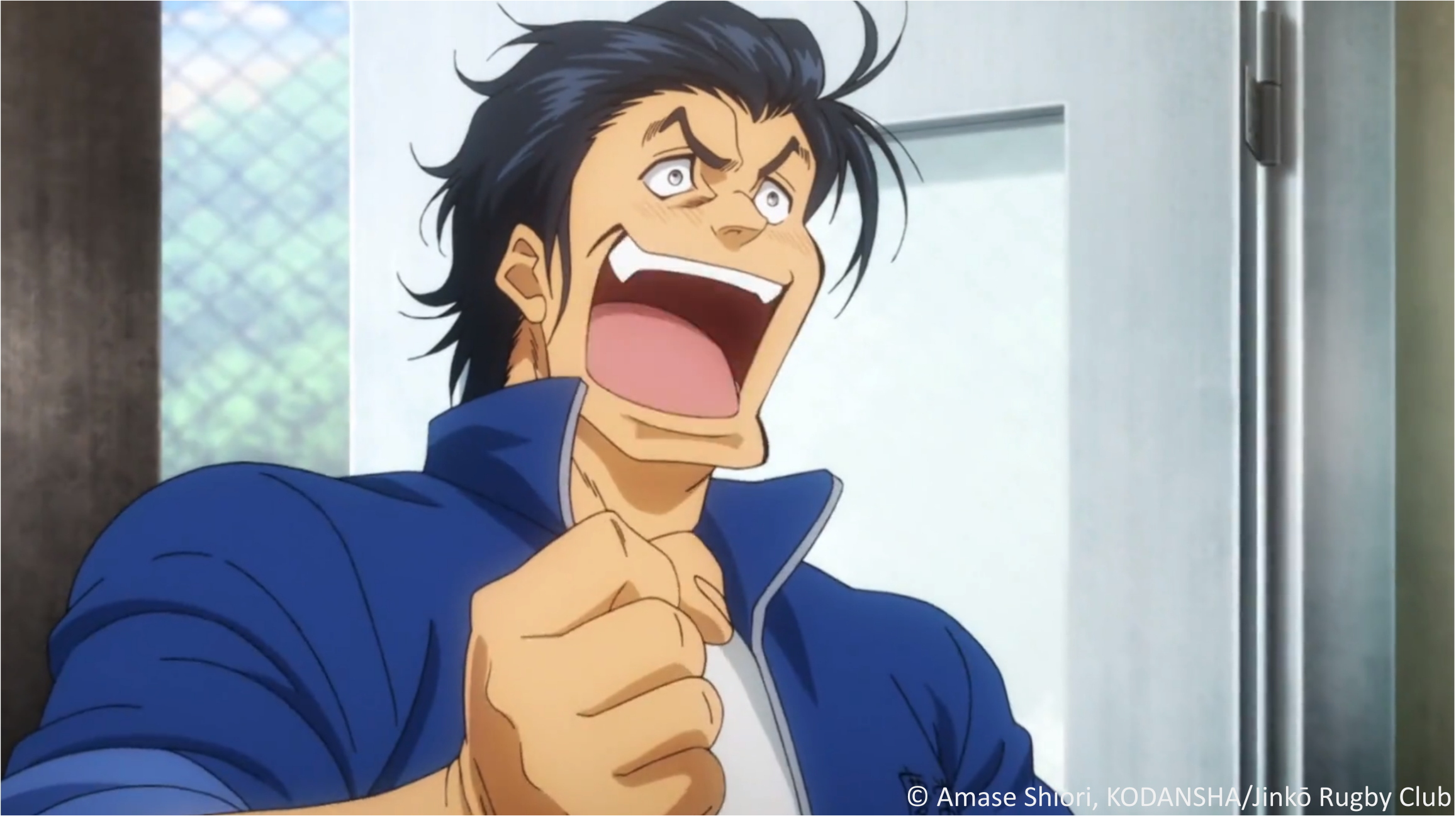
Team And Spirit
Those of you who are familiar with the anime might wonder why I started off by talking about Sekizan and not the protagonist, Gion Kenji. Also, I’m not sticking to the story’s order because All Out!! begins when Sekizan is already in his third and last year of high school and the team’s captain. Sekizan’s initial refusal to join the unenthusiastic rugby club, his frustration about losing a match, as well as his unbreakable determination, teach us about two major topics of the story: team(-work) and spirit, both of which are addressed repeatedly.
To dive a little deeper into these subjects, we must end our trip into the past and travel to the present, where Sekizan is captain and Gion has already joined the club. There, Matsuo, a third-year member of Jinkō rugby club, is watching Sekizan and his teammates go all out in a practice match. Sitting beside him are Gion and another benched player, Ebumi (the ‘delinquent’). Matsuo uses the proceedings of the game to teach them how important it is to have victory as a common goal in rugby. “You can’t do it alone. There are 15 guys on the field. You’re not playing rugby unless the whole team wants to win.” Being a team sport, this sounds like a no-brainer. Especially in rugby, where the various positions demand specific athletic abilities, teamwork is said to be of paramount importance. But at Jinkō, any kind of (individualistic) play, if not done for the benefit of the team, was clearly disapproved of, as Gion had to find out. And Iwashimizu Sumiaki, the other first-year addition besides Gion, learned that fear and mental weakness can cost you a dear friendship.

One For All
Now, it’s finally time to introduce the main character, Gion Kenji! Gion had never done sports before—not for lack of trying, though. But his small body prevented him from enjoying sports with his peers, who only expressed their irritation as soon as he tried to participate. This fueled his frustration about being small even further. Additionally, his size entailed all kinds of drawbacks in his daily life, like being sold children’s clothes, being offered candy by the elderly, and being unpopular with girls.
Right after entering Jinkō, he learned about rugby and immediately decided to join. His motivation to do so was for one reason and one reason only: to indulge his anger against tall guys by knocking them off their feet. Tackling offered him a chance to get revenge on those whose size he envied. Consequently, Gion directed his efforts primarily toward a sole goal: learning to charge headlong at the ball carriers and ram them with all his might. Except for pleasing his ego, this single-minded approach reaped little success on the field. In the end, coach Komori reproached him for his behavior: “You won’t make it anywhere with such a selfish playing style.”
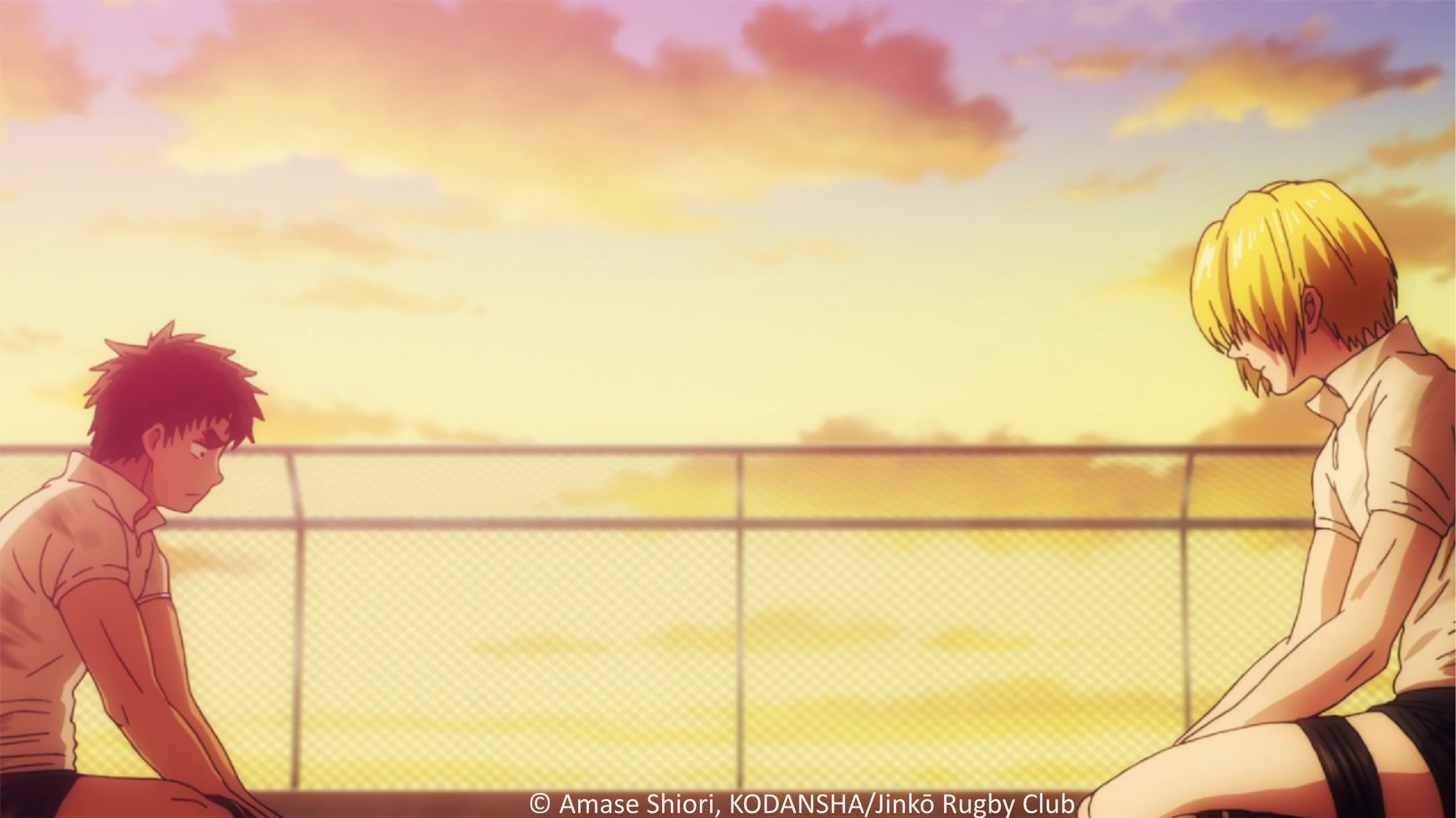
After this scolding, Gion retreated to the school’s roof and pondered his behavior in solitude. That is, until Iwashimizu joined him and confronted Gion with his resentment toward tall men: “Are you tackling for the team? Or are you just taking out your frustration on us tall guys?” Realizing his wrongdoings, Gion mended his ways, which, luckily for us viewers, happened within a single episode. So, we are quickly—and with a light heart—back to the important part of the story, the game of rugby. Just in case the swift resolution should tempt us to take this issue lightly, Komori reminds the team (and us) at the end of the episode: “Having a particular playing style is good. But if you’re just doing it for yourself, it’s worthless. Don’t play for yourselves. Whether it’s tackling, scrums, or tries, do it for the team.”
“Get Lost.”
Despite his apparent lack of many things regarding rugby, what Gion didn’t lack was a fighting spirit and an unwavering determination not to give up. At times, his loud voice and direct manner, his overflowing energy, and his desire for round-the-clock training reminded me of Hinata (Haikyuu!!) or Sawamura (Ace of the Diamond). However, not all characters in All Out!! boast an infinite supply of energy and self-confidence. One of those is Iwashimizu, who is the total opposite of Gion. He is very tall and has already played rugby in middle school. But he is also very timid and insecure. During a training session in middle school, he critically hurt his best friend’s shoulder while tackling him. As a result, Miyuki (his friend) couldn’t play for the rest of the season.
Shoulder dislocations seem to be quite common in rugby. But the list of potential injuries is long, ranging from concussions and other head and neck injuries to sprains, fractures, or damages to the spinal cord. Although type and incidence rate might vary depending on the players’ position, as each position has different physical and tactical requirements, tackling seems to be the number one cause of injuries.
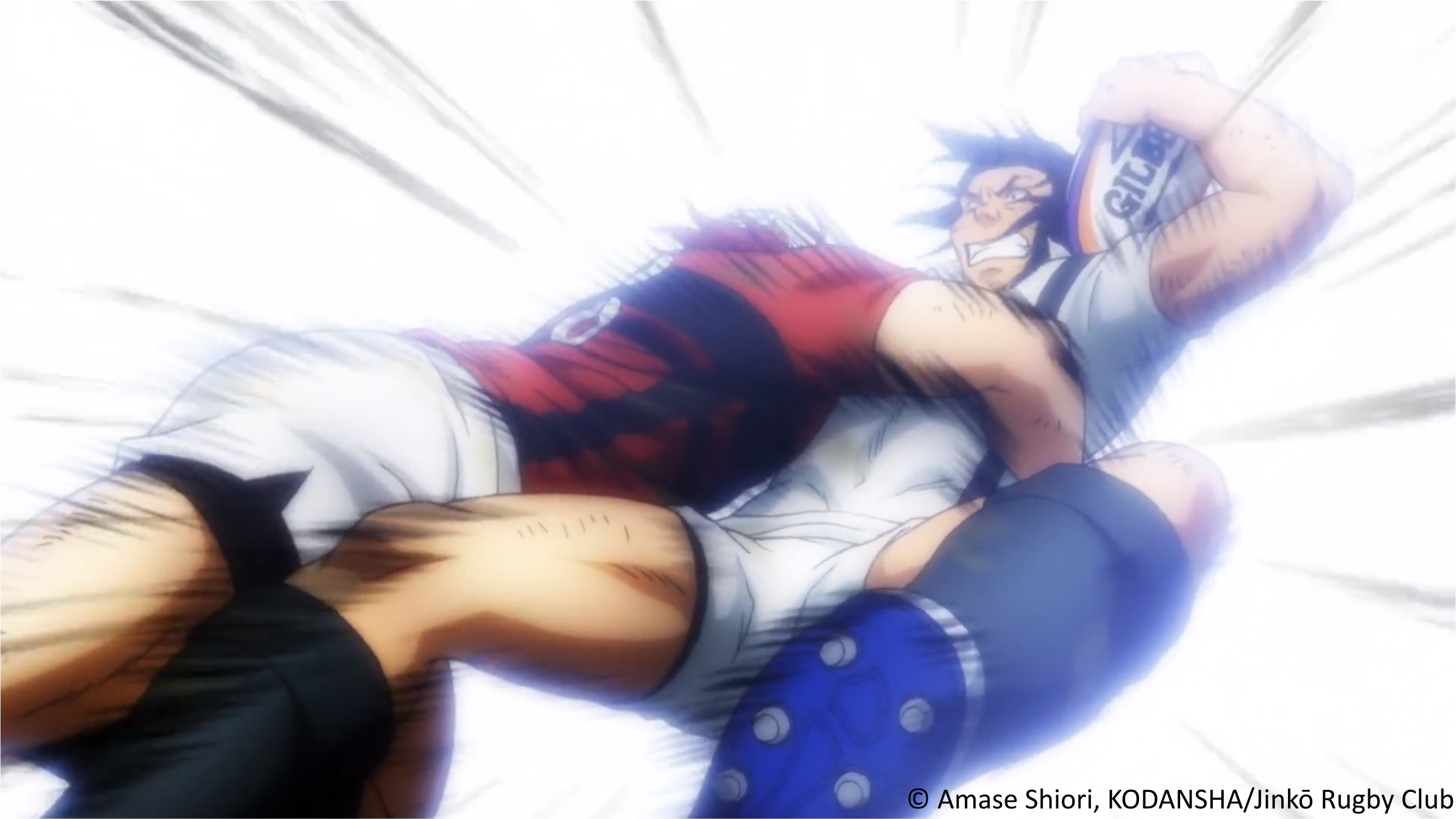
Out of fear of hurting anyone else, Iwashimizu shied away from the collisions, which is detrimental considering how important tackling is in this sport. Matsuo explains: “Rugby is a physical sport. Still, the most important thing in rugby isn’t physical ability. It’s overcoming your fear and charging full force into opponents bigger than yourself.”
As it happens, Iwashimizu and Miyuki met again in high school for a practice game between their schools. With his shoulder fully healed, Miyuki was eagerly looking forward to clashing with his friend again. But he was bitterly disappointed when Iwashimizu avoided the challenge, and Miyuki immediately expressed his disdain for this fearful behavior: “A guy who can’t even attempt to tackle doesn’t deserve to stand on the field. You’re just a giant eyesore. Get lost.” When I saw Iwashimizu’s body tremble, his eyes widened in shock and horror at his inability to tackle and at the prospect of losing his friend, my chest tightened. Fortunately, Gion’s encouraging shouts mid-game, “This is our ball he’s got!!” reminded him about his responsibility toward the team, and he could thus overcome his fear. Spirit restored, he was able to stop Miyuki in his tracks in the next attack. And so, this issue, too, was resolved quickly, and the two athletes were best buddies again by the end of the game.

Fiction And Reality
Except for Iwashimizu, none of the young men showed fear of being tackled or hesitated to ram into the other athletes. Over and over, bodies crashed into bodies with such explosive intensity that the trembling ground shook the camera so violently that it blurred the image, and I had to take hold of my laptop, lest the impact’s shockwaves would throw it off the table. Opponents were flicked to the side like annoying insects, smashing the weaker one into the ground. And trying to save the ball from the rival team, players engaged in a battle of strength. Under strained grunts, they pushed and shoved their massive frames forward against a seemingly unmovable wall of flesh and bone. How on earth can these guys just brush off such attacks and get back on their feet as if nothing happened? How can they endure the pressures put on their bodies in scrums and mauls? I know, I know, this is a fictional work. But rugby is a real sport with real athletes. I can’t imagine the physical condition your body must be in to endure such ‘treatment,’ as well as the attitude necessary to expose yourself to such a risky sport on a daily basis.

Do they really have no fear, as the individual tales of the players in the anime suggest? Unfortunately, I don’t know any rugby athletes personally to gain more insight into their opinions. So, let’s ask those in All Out!! what they think about this high-contact sport.
“Oooowww!! That’s Fun!“
Gion, as we already know, loves to tackle other guys. But being tackled is just as fun! When he received his first (practice) tackle by Iwashimizu, he was catapulted through the air and landed with a heavy thud on his back. Propping himself up, face flushed, and smiling from ear to ear, he shouted out, “Oooowww!! That’s fun! Rugby is fun!” I can only assume that the sensation of being hurled through the air and the pain of landing on his back, along with the experience of having the air knocked out of his lungs, must be an exhilarating feeling. Gion survived this flight unharmed. Why? Because according to him, only those who run away or those who are weak, like Iwashimizu’s friend Miyuki, get hurt. So, I guess, as long as you are ‘strong’ and ‘stand your ground,’ there’s no risk of injury… .

For Ebumi, the supposed delinquent, rugby is all about manly fighting. He once heard on TV that “Rugby is just lawful brawling. The rules allow you to knock down your opponent.” Essentially, he just brought the skills he picked up on the street to the field, together with a strong determination to win because “What man wants to lose a fight?!” The girl manager of Jinkō, on the other hand, is certain that the rules make rugby a gentleman’s sport. After all, she explains, the throw-in following a foul play grants both teams an equal chance of catching the ball, regardless of who committed the foul. And she’s not the only one to think so. The athletes in Number24, another rugby anime, agree with her.
As for me, when I watched the players during practice and games, I couldn’t conjure up an image of slender, classy men with canes and top hats bowing respectfully to each other. These guys were out to get each other (athletically). As a result, they have sturdy bodies needed to withstand sudden collisions and blows, as well as enormous physical pressures. Therefore, I was all the more surprised by coach Komori’s first lesson, where he told his team that rugby isn’t a contest of physical strength but rather a tactical game. The right strategy can give you the upper hand against a physically stronger opponent. However, when Jinkō played against Todo-dai Sagami, they were confronted with another valid strategy: rough play, which, at times, bordered on illegal play. This more physical than tactical strategy is intended to cause bodily (and maybe also mental) harm. But no matter! Because injury, whether by accident or inflicted on purpose, is just another chance for the young rugby players to prove their valor. And Sekizan shows us how this is done.
I Laugh In The Face Of Injury

When Sekizan received an unintentional kick to his head, he got back up immediately and, blood streaming down his face, announced in a Terminator-like manner his quick return to the field: “I’ll be right back.” Now, for those of you who haven’t seen the anime, I have to explain that the kick wasn’t a light tap that just brought his stylish hairdo into disarray. (Sekizan’s hair was always in perfect order, even after the kick.) It was a full-blown lunge at the ball, intended to make it fly as far up the field as possible. But Sekizan, in a suicidal attempt to save the ball from the enemy, threw himself protectively before the oval-shaped form. It’s impossible that he didn’t get a concussion from this hearty kick. Yet, coach Komori, unfazed by the injury, just patched him up, and with a bandage on his head, Sekizan returned to the field. As knowledgeable as the coach might be, he clearly didn’t read the World Rugby Concussion Guidance, which states (among other things) that “the player should at least be suspected of having concussion and be immediately removed from play or training” in an “injury event that could possibly cause concussion.” In Komori’s defense, I have to add that players themselves tend to understate the seriousness of injuries, which is clearly also the case for Sekizan.
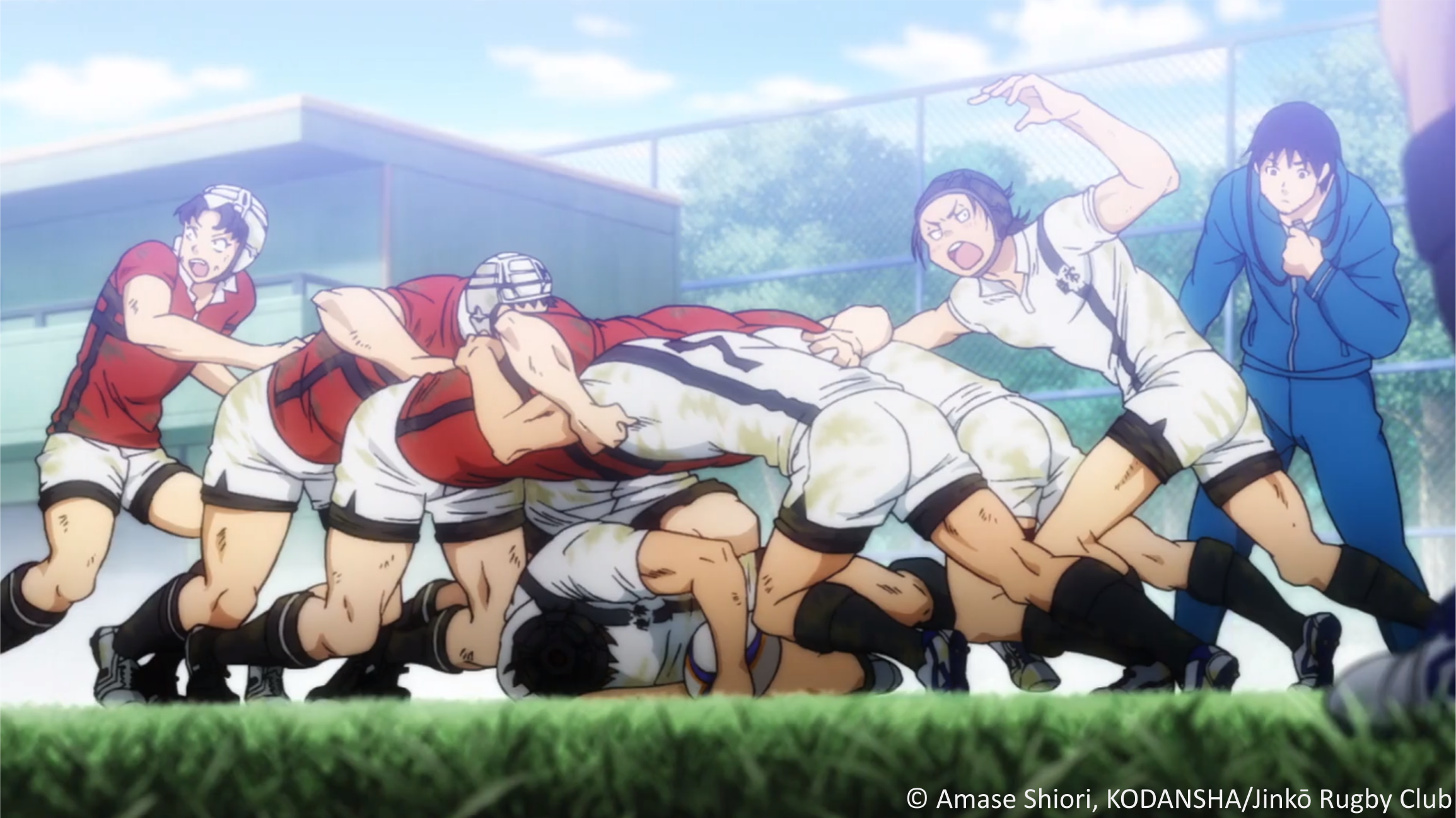
So, what is rugby to Gion, Sekizan, and the others? First of all, rugby is a sport for the stouthearted and fearless. It’s a dangerous and risky sport, but only if you’re physically and mentally weak. It’s a tactical sport, especially if your opponent is physically stronger than you. It’s also a gentlemanly sport that nonetheless allows brawls and ‘rough’ play. Pain is part of the fun, and injury is there to be ignored, unless it’s a ‘serious’ one like a dislocated shoulder. How much truth there is to this, only a real athlete can say. If you are curious, you might want to watch the Amazon documentary about New Zealand’s national team, the All Blacks.
Now, before the painful memories of my own (comparatively minor) sports injuries flare up, let’s change the subject… and turn to matters of the heart.
Heartbreaking
All Out!! is a sports-centered story. Except for the team’s onetime visit to the coach’s house, where we meet his sweet, adorable wife, everything revolves around rugby. Family conflicts, brotherly love, or friendship; the trip to the beach and the love letter—whether blood is boiling or tears are shed, rugby is always at the center. The characters’ backstories, too, whether they carry emotional burdens or deal with interpersonal conflicts, revolve around this sport. Even though most of these problems were resolved rather quickly, it didn’t feel hurried. The individual stories were touching, and knowing their prior suffering, I couldn’t help but cheer excitedly for the boys when, drenched in mud and sweat, they finally scored a try or took down an overpowering opponent. Yet none of the scenes were more heartbreaking than Keta’s goodbye.
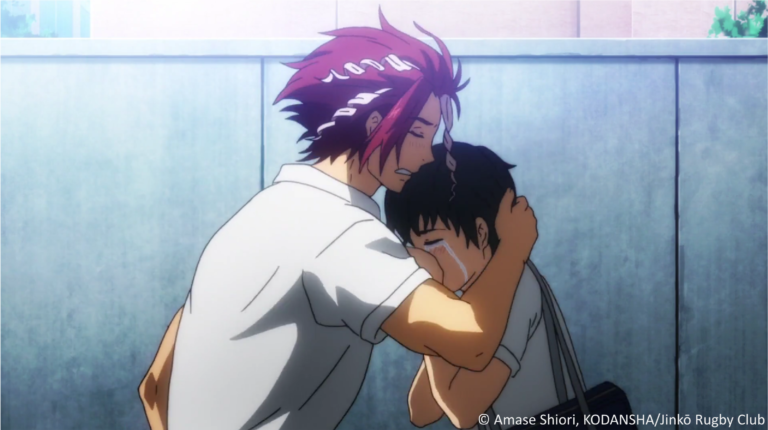
All Out!! provided me with the rare opportunity to thoroughly clear out my tear ducts. I can’t remember reaching hastily for tissues in a scene that focuses on a hitherto unknown character. In this case, the first-year rugby club member Keta Yūto. Usually, I don’t care if a side character leaves the story, but Keta’s exit was different. I haven’t seen such a tragic and painful goodbye since Rose lost Jack in the sinking of the Titanic. Under a flood of tears, Keta confessed to Sekizan that despite his love for the team and its captain, he has to leave the club because his body just can’t take the tough training anymore. Hearing his sobbing and listening to his trembling voice, I felt my own heart shatter. The shocked and devastated look on Sekizan’s face made it clear that every single member is of utmost importance and that losing Keta is a heavy blow. I, too, was shaken about Keta leaving. And particularly about how much I suddenly cared about an unfamiliar side character. After Keta promised he would come to cheer them on, once Jinkō made it to the Hanazono, the two young men embraced each other in a last farewell.
I was grateful that Sekizan mentioned the Hanazono because it gave me a chance to collect myself after this emotional turmoil by going on a brief research trip.
Beyond the Hanazono
The only thing we learn about the Hanazono, the National High School Rugby Championship, in the anime is that it’s equivalent to baseball’s Kōshien. With such high significance, it’s no surprise that the guys are eager to go there. As with the Kōshien, the nickname of the event is derived from the stadium, the Higashi Ōsaka Hanazono Rugby Stadium. From December 27, 2023, until January 7, 2024, the stadium will erupt with the sounds of high school athletes crashing into each other.

However, before that, the Rugby World Cup will take place! Japan will be one of the twenty nations participating in this event, which will take place in France from September 8 until October 28, 2023. The country has competed in the World Cup since its inaugural tournament in 1987. In 2015, the national team caused an upset by winning against top contender South Africa. And in 2019, when the World Cup was hosted by Japan, the Brave Blossoms made it into the quarterfinals for the first time ever. Ranked 14 out of 109 nations, Japan has something to show for. The same goes for the women’s national team, the Sakura Fifteen, which is currently ranked 11 (out of 61 nations).
From Field To Page To Screen
Similar to the sprouting of soccer anime and manga with the approaching FIFA World Cup back in 2022, so too was the hosting of the 2019 Rugby World Cup reflected in popular culture. In 2009, it was announced that Japan had won the right to host the event, so there was plenty of time to bring the sport closer to the public. The coming years brought rugby manga and their adaptations with All Out!! and Try Knights; the anime original Number24; and Beast Children, a manga without adaptation.
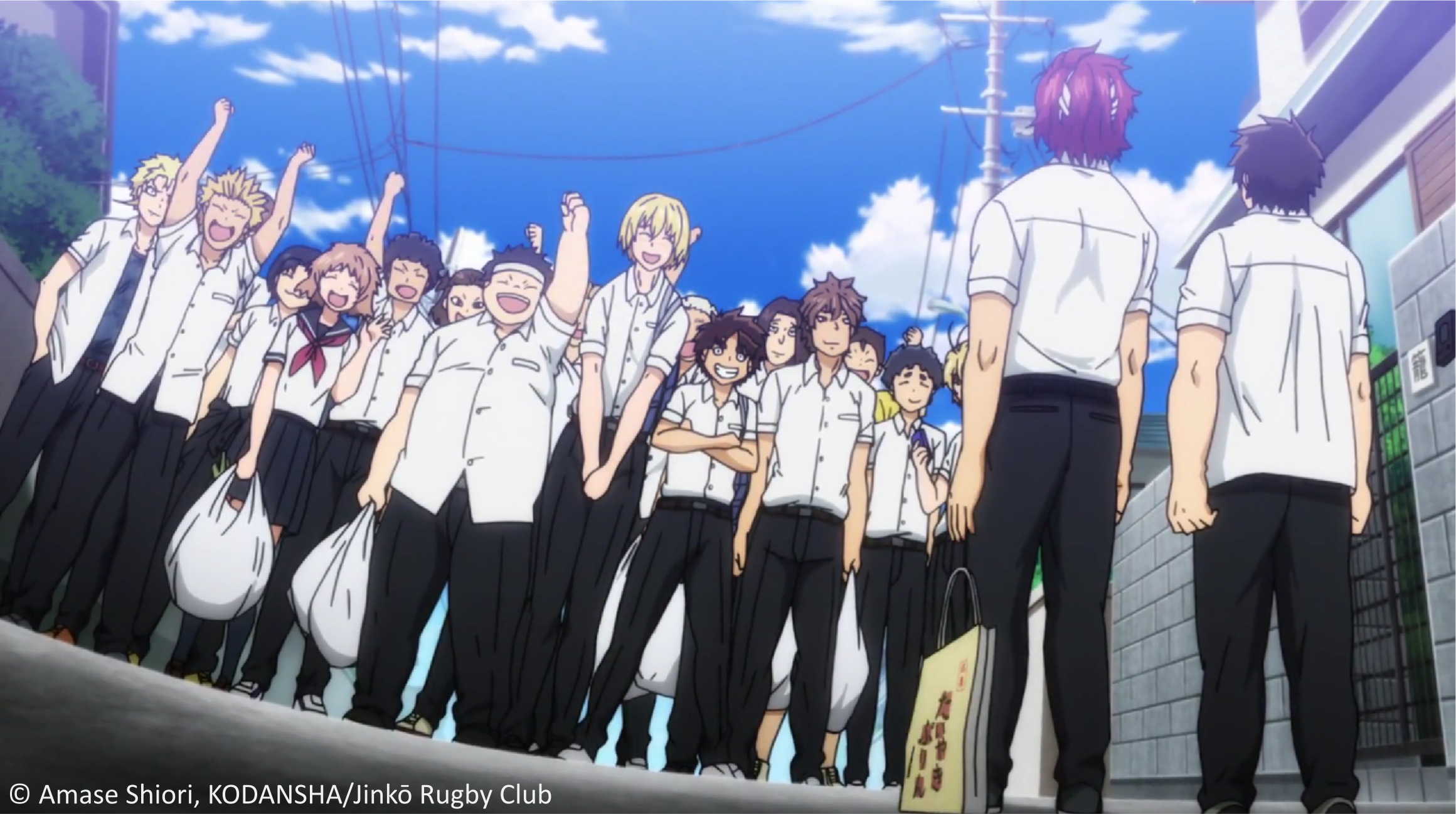
Regarding the anime, All Out!! is clearly number one. Try Knights is such a cheesy story where some of the one-dimensional cast members were given absurd character traits. Conversations and interpersonal relationships left me dumbfounded several times. The story’s development is borderline ridiculous, and the lazy (or hastily produced) animation made the games incredibly boring and painful to watch. A commendable aspect was that after every episode, rugby plays or rules were explained. Number24 was better story-wise, and the games were fun to watch, too. Although the ‘high-gloss’ animation style and the boy band-like cast would have fitted well with another genre, too. If you enjoy watching slender, pretty boys with sparkly-shiny hair of various colors work out their bromances on and off the rugby field, this might be the right sports anime for you. But ‘good looks’ aren’t lacking in All Out!! either. Actually, this anime offers a fair share of fan service. The muscular, well-toned rugby players surprise us by striking model poses in their tight-fitting uniforms in the most unexpected moments. By the way, from reading the first six chapters of Beast Children on the Manga Plus app, this story seems promising, too. (I don’t know if there’ll be fan service, though.)
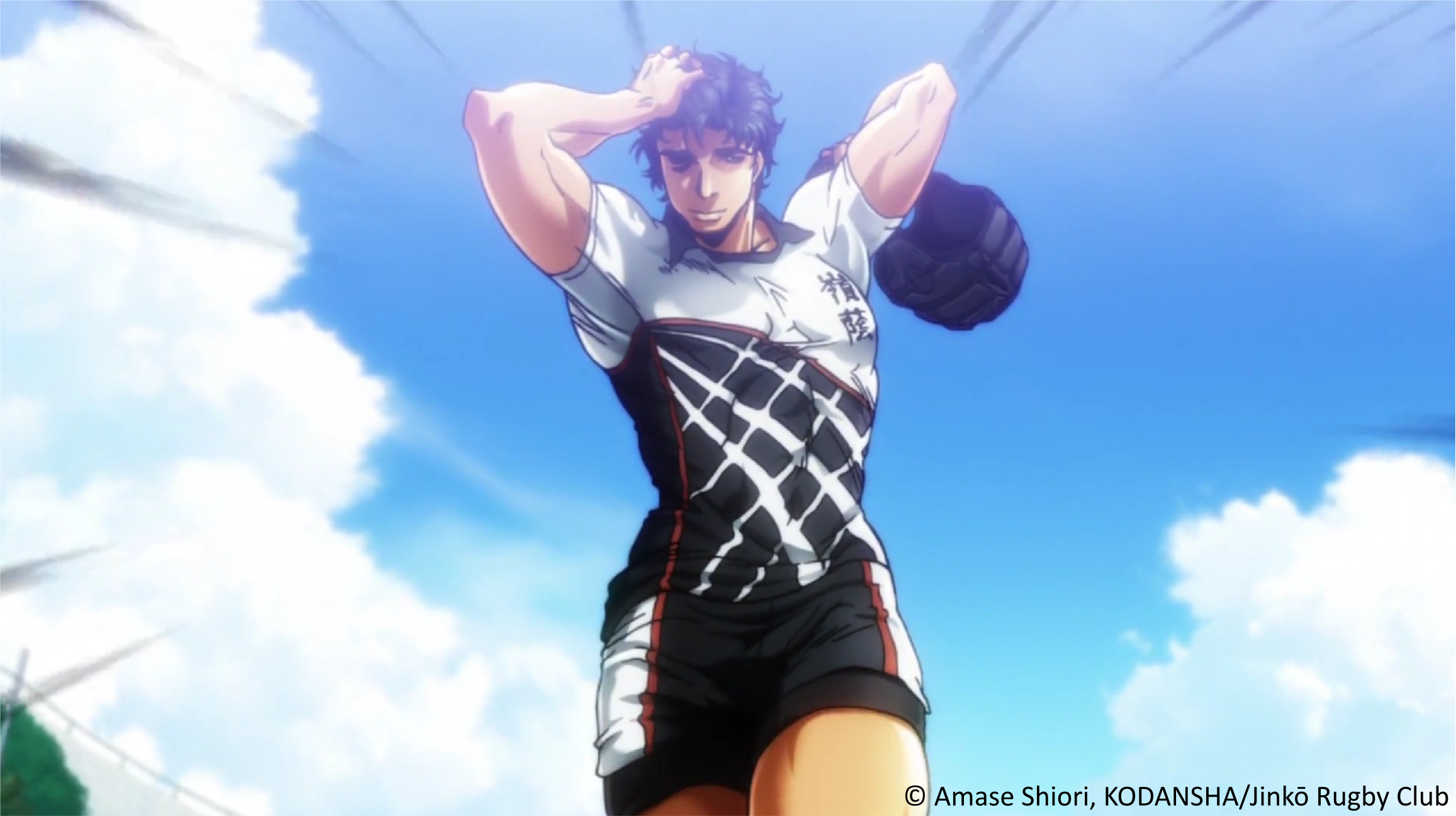
Adaptation Victim
All Out!! is a gripping sports anime with a great cast, tough practice sessions, exciting games, and hilariously funny comic relief. While I tensed up watching Iwashimizu confront his fear, I laughed heartily at the princess-carry training drill. I’m not very musical, so I hardly ever notice the accompanying background sounds consciously, but the music in All Out!! is amazing! When it set in during a game, the excitement it promised and gave me goosebumps. Often, I was so captivated by the story and the games and taken in by the music that I totally forgot to take notes and only realized it when the end credits suddenly started.
Now that I’ve seen several rugby anime and have become familiar with some of the complicated rules, I feel well prepared for the upcoming World Cup. Although, to get a better grip on the technical part of the game, I had to consult additional sources like the adorably animated and easily understandable videos about rugby rules by the Japan Rugby Football Union. But what about Jinkō? What challenges still lie ahead for the team? How will the boys fare in their first official game? Will they make it to the Hanazono? Aaahhhh!! I fell right into the adaptation trap! Alas, there is no second season, so now I have to buy the manga to find out how the story continues!

Subscribe to never miss a deep dive into the exciting world of sports anime, manga, and manhwa!

